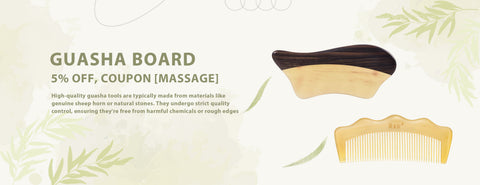Guasha: Do's and Don'ts for Optimal Results with Guasha Board
Guasha, an ancient healing technique, has gained widespread recognition for its various health benefits. However, for those new to guasha or even experienced practitioners, it's crucial to understand the do's and don'ts to ensure a safe and effective experience. In this article, we will explore the essential guidelines to maximize the benefits of guasha while avoiding common pitfalls, incorporating the use of guasha tools.
The Do's:
- Choose High-Quality Guasha Tools
High-quality guasha tools are typically made from materials like genuine sheep horn or natural stones. They undergo strict quality control, ensuring they're free from harmful chemicals or rough edges, which could harm your skin.
Besides, these tools are built to last, providing you with years of reliable use, unlike cheaper alternatives that may deteriorate quickly.
- Apply Adequate Pressure
Use gentle to moderate pressure during guasha. The unique texture and properties of sheep horn tools provide a soothing yet therapeutic experience, ensuring you don't overexert.
- Prepare Your Skin
- Follow Meridian Lines
Premium guasha tools are designed to effectively target different acupressure points and meridians in the body. Their smooth surfaces and precise shapes enable them to stimulate your skin and muscles optimally. Knowledge of meridian lines is particularly important when using guasha boards. Their shape and design make it easier to target specific areas for maximum benefits.
- Practice Regularly
Consistency is key. Incorporate guasha into your routine, ideally a few times a week, to experience the full potential of sheep horn tools and guasha boards.
- Stay Hydrated
Drink plenty of water before and after guasha to help flush out toxins released during the practice, further optimizing the effects of sheep horn and guasha board guasha.
The Don'ts:
- Avoid Broken Skin
Never guasha over broken or injured skin. Broken skin provides a direct pathway for bacteria and pathogens to enter the body. This increases the risk of infection and can lead to various skin-related and systemic health issues. It can also cause significant discomfort and pain, as the scraping motion aggravates the wound.
- Don't Over-Scrape
Limit the number of passes over the same area. Excessive scraping may lead to skin irritation, redness, or irritating the skin and prolonged recovery times. To fully enjoy the benefits of guasha, it's essential to use gentle and controlled strokes, allowing the therapy to stimulate circulation and alleviate tension without causing undue discomfort.
- Skip Bony Areas
Avoid guasha on bony areas, such as the spine or joints. Scraping these bony regions can cause discomfort and even lead to bruising or skin irritation. Moreover, the bony areas are not as prone to the accumulation of stagnant energy or toxins, which are the main targets of guasha. Focus on fleshy areas where meridian lines are more prominent.
- Don't Rush
Guasha aims to release stagnation, which includes trapped energy, toxins, and tension. To effectively address these issues, you must allow time for the body's natural responses to engage with the therapy. Rushing through guasha may not provide adequate time for the skin to redden or for the therapeutic effects to manifest fully.
- Avoid Pregnancy Areas
Be cautious around specific acupuncture points believed to induce labor. Consult a healthcare professional if you're pregnant or nursing before practicing guasha, even with sheep horn tools.
Understanding these do's and don'ts is fundamental to enjoying a safe and beneficial guasha experience, especially when utilizing guasha boards. Remember that guasha is a complementary therapy and should not replace medical advice or treatment when needed. With the right approach, guasha, complemented by sheep horn and guasha board tools, can become an integral part of your self-care routine, supporting your overall well-being.










